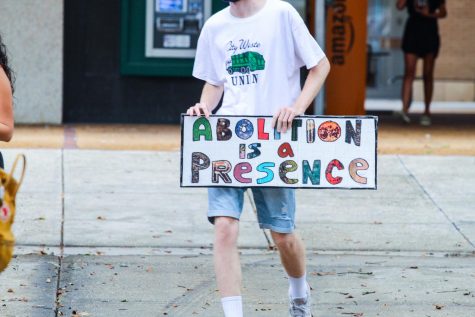OPINION | Without abolishing the police, justice remains unattainable
April 21, 2021

On April 11, officer Kim Potter shot and killed 20-year-old Daunte Wright in Minnesota. A few days prior, on March 29, a Chicago police officer killed 13-year-old Adam Toledo. These tragic deaths, among others and along with the Derek Chauvin trial, have brought conversations about the state of the policing system in the U.S. to national attention once again. Specifically, the case for abolishing the police has become the center of national debate.
Abolition is, broadly, a simple idea. Abolitionist ideologies advocate for the elimination of the policing system rather than simply supporting reforms. The support behind police abolition is rooted in the idea that the existing system is beyond reform, and to truly achieve justice, the whole system needs to be broken down and its resources allocated to community well-being.
Abolition is often incorrectly conflated with various reformist beliefs such as defunding the police. Defunding the police refers to the process of divesting money from law enforcement departments and investing them in uplifting communities by promoting safe and permanent housing, mental health resources, education and much more. While defunding is typically considered the first step to reaching abolition, it is far from the end. Abolition is not a process that is intended to take place overnight. Quite the opposite, abolition is structured as a slow, strategic process to achieve a policing-free world. The prominent abolitionist group 8toAbolition details an eight-step plan to create a police-free world. The eight steps are defunding the police, demilitarizing communities, removing police from schools, freeing people from carceral institutions, repealing laws that criminalize survival, investing in community self-governance, providing safe housing for all and finally, investing in care, not law enforcement.
As students of a university that is rooted in white supremacy, located in a city that has a fraught relationship with policing and criminal systems, it’s especially crucial to understand the importance of abolition. Reimagining a New Orleans without the police is not as daunting as it may sound. Abolition can best be understood as an acknowledgement of the way white supremacy has shaped our society and a commitment to addressing these underlying issues. Frequently, opponents of abolishing the police argue that it will only lead to a more dangerous society. Abolition, however, doesn’t mean abandoning all ideas of public safety. It means redefining them.
The New Orleans Police Department’s approach to public safety, for example, is that the more police officers present, the safer the environment. Essentially, abolition reimagines public safety outside of the framework of law enforcement and rather centers on investing in public safety by funding community programs like the ones endorsed by abolitionist groups.
New Orleans is a particularly interesting case study of policing. Following post-Katrina revelations that the NOPD was a highly flawed and corrupt institution, as exemplified through several instances of police killings and incredibly high arrest rates, the department faced investigations from the FBI and the Department of Justice. As a result of these investigations, the NOPD was put into a severe consent decree to reform the department and was required to make serious changes to the police procedures regarding searches, interrogations and more. Additionally, NOPD became the first department in the country to set up all their officers with body cameras. Because of these reforms and others, New Orleans is frequently touted as a model for police reform.
These reforms may be huge internal advances, but it’s crucial to note that policing in New Orleans continues to be highly problematic. That is simply the nature of policing. NOPD continues to get the largest chunk of funding from the city, about 25 percent according to recent data, and their budget has steadily grown over the years. The department has implemented several surveillance programs that are based in racial profiling. The department’s partnership with federal agencies, such as the Department of Homeland Security, has led to high rates of arrests for low-level prostitution and drug offences. Today, officers in New Orleans disproportionately stop and search Black people as opposed to any other racial demographic. While the department may have undergone significant changes, they maintain an oppressive level of power over the New Orleans community. Public safety in New Orleans, as it stands, means allowing over-policing and the targeted arrests and profiling of marginalized groups.
Several people argue that reform, not abolition is the most viable and effective option. The policing system, however, is beyond reform. To quote Audre Lorde: “For the master’s tools will never dismantle the master’s house. They may allow us temporarily to beat him at his own game, but they will never enable us to bring about genuine change.” From its origins in slave patrols, the policing system in the U.S. has proven itself irredeemable, and at its very core, it has always been a mechanism of oppression. Viewing any sort of policing system as an enforcer of public safety is not an universal experience. It’s a privilege that many marginalized communities are not afforded. Radical change like abolition is the only way to create a more equal and just society. The faster we understand that, the better it will be for us all.





















Cheel saukeel • Jul 21, 2021 at 9:28 am
Id like to see what aproova has to say next she gets robbed by a thug on her way home to campus. Or if she gets shot at running away from a mugger. Something that has happened to a tulane student. The people at this school truly have no concept of reality and the city they live in. Do you even know how much violent crime has risen since our dear reformist LATOYA CANTRELL has made budget cuts and layoffs to NOPD. Hey I want to commend you for talking out of your ass and making statements that are not supported any facts what so ever. By the way I am going to assume like most Indian kids in this university you grew up in the nice sheltered suburbs without any clue what is like to live in a dangerous inner city community. Man I really wish kids here would see the real world once
Rachel • May 7, 2021 at 9:59 am
It’s funny how those against abolishing the police ask what we would do with people who have committed crimes. You’ve missed the point entirely, unfortunately, because you still have the boot so far down your throat. The entire point of abolishing the police, and more broadly the prison industrial and military industrial complexes, is that there would be massive funding opportunities to reinvest in the community. Crime does not happen in a vacuum. Nobody is born evil, ready to commit crime. Unequal wealth distribution, resource scarcity, and no chance for class mobility (which are all branches of white supremacy) lead people to commit crimes out of necessity. Abolition entails a restructuring of society where everyone is able to have more than enough to survive, which would eliminate the root causes of crime. Besides, it’s not like police can actually stop crime. All they can do is show up after the fact to attempt to run damage control, which they’re highly incompetent at. What do you have to gain from advocating for police, the people who murder our neighbors in cold blood, and would do the same to you without a second thought? Absolutely nothing. What do you have to gain from investing in the community around you, and building strong relationships of accountability? Absolutely everything. It’s really not that hard to see if you put on your thinking cap for maybe 5 minutes.
cydney • May 6, 2021 at 11:36 pm
LOVE this analysis and breakdown!!! An amazing read.
Theodore • Apr 25, 2021 at 9:56 pm
I’ve been a perennial supporter of the Hullabaloo but articles like this make me regret my past fondness of the paper. For a community that persistently reiterates the necessary illumination of privilege, do you not see the irony? The abolishment of the police is an idealistic and impractical solution to very real issues. The writers of the Hullabaloo are consistently ignorant to the gravity of their suggestions and the inapplicable solutions that they propose. They are able to write such papers because the safety of their campus and their local communities seems totally unnecessary, as it is all they know.
Unfortunately, and the absolute worst part of all, the writer didn’t even offer a novel solution to the problem; they resort to a simple citation of an external organization. An organization that advocates to “disarm law enforcement officers, including the police and private security.” Well, doesn’t that appear to be an apt solution to dealing with gang violence.
Lastly, the writer’s conception of abolition is ignorant to the point of being borderline comedic. “Essentially, abolition reimagines public safety outside of the framework of law enforcement and rather centers on investing in public safety by funding community programs like the ones endorsed by abolitionist groups.” Essentially, this article is ridiculous.
Emrey • Apr 25, 2021 at 6:40 pm
I wholeheartedly agree, Apoorva! Brilliant analysis of the police system along with the prison-industrial complex. True reform (in most cases) can only come from abolition.
Ethan • Apr 24, 2021 at 10:06 pm
My god is this the critical thinking Tulane has taught you?
Chase du Maurier • Apr 24, 2021 at 3:04 am
While we’re at it lets abolish the Hullabaloo…good riddance.
Andrew • Apr 22, 2021 at 9:39 am
So serial killers, rapists, murderers and the guy who was robbing and shooting people near the Tulane campus should not be arrested? They should be allowed to keep doing what they want to? Dylann Roof, who murdered nine African-Americans in their church, should not be arrested? Derek Chauvin should go free? What else do you think all of these people would do if they didn’t have to worry about being arrested and put in jail? I’m shocked someone believes what I just read. There are some very bad people of all races in this country and they need to be arrested and put in jail so they can’t hurt anyone else.